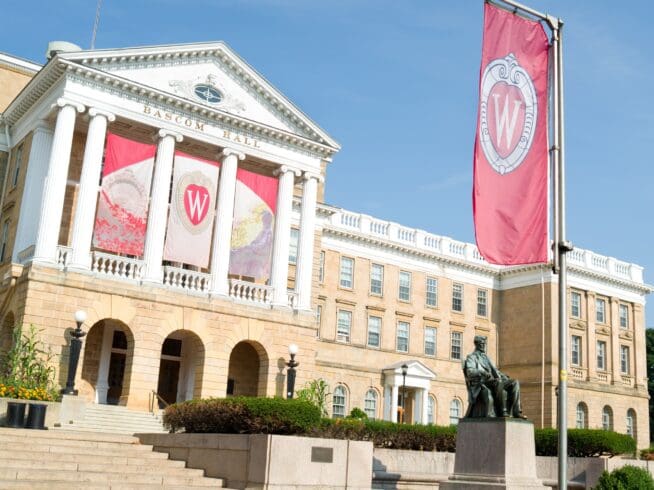Top Wisconsin Republican says he’s looking into cutting minority scholarships

Emily Singer
Assembly Speaker Robin Vos said he’ll review grants to minority students following the Supreme Court’s ban on affirmative action.
Wisconsin state Assembly Speaker Robin Vos said he is mulling whether to eliminate educational grants to minority students, his latest move in an ongoing effort to curtail diversity and inclusion programs in the state.
Vos said he is looking into whether to cut the grants following the Supreme Court’s June 29 ruling that struck down affirmative action policies in college admissions.
“We are reviewing the decision and will introduce legislation to correct the discriminatory laws on the books and pass repeals in the fall,” Vos tweeted. Vos’ tweet came in response to a tweet that said Wisconsin should get rid of such grants.
“The Wis. Leg. can take some easy steps after this decision such as fixing numerous scholarships, grants & programs that exclude millions of Wisconsinites because of their race,” Dan Lennington, an attorney with the Wisconsin Institute for Law and Liberty, tweeted. The Wisconsin Institute for Law and Liberty is a conservative group that has filed multiple lawsuits in the state trying to make it harder for Black residents to vote and gut protections for LGBTQ residents.
In Wisconsin, minority students can apply for the Lawton Undergraduate Minority Retention grant, which according to the University of Wisconsin-Madison is a grant “to provide financial assistance to statutorily designated minority Wisconsin undergraduate students (African-American, Latino, Native American (American Indian/Eskimo) and Southeast Asians of Vietnamese, Cambodian, Laotian, or Hmong descent who entered the United States after December 31, 1975) to improve their opportunities for retention and graduation and lessen the burden of student debt.”
The grant is one of a number of grants and scholarships that students in Wisconsin can apply for, including for students in the Wisconsin Covenantprogram, for students who are the child or spouse of a deceased veteran, and for the children of ambulance drivers, correctional officers, firefighters, emergency medical services technicians or law enforcement officers killed in the line of duty in Wisconsin.
Eliminating the minority retention grant would be the latest move by Republicans in the state against diversity and inclusion programs at colleges in Wisconsin. Those programs seek to “increase access for underrepresented minorities in STEM; eliminate the achievement gap between majority and underrepresented students; recruit and retain a more diverse faculty and staff; prepare all our students, staff and faculty to thrive personally and professionally in a world that is diverse, global and interconnected; [and] enhance the campus climate for inclusion,” according to the University of Wisconsin-Madison’s Division of Diversity, Equity & Educational Achievement website.
In June, Republicans voted to cut $32 million from the state university budget slated for diversity, equity and inclusion programs. The Legislature said the university system could get the money back if it agrees to use the funds for workforce training instead.
As of the fall 2022 semester, only 2.4% of students at the University of Wisconsin-Madison, the state’s flagship university, were Black, according to Wisconsin Watch — 1,214 out of the 49,587 students enrolled at the university.
The Milwaukee Journal Sentinel reported that minority students in the University of Wisconsin System are angry about the cuts to DEI programs.
Uniqua Adams, a Black woman and doctoral student at the University of Wisconsin-Milwaukee, told the Journal Sentinel that diversity programs helped her navigate through college and earn a degree.
“If we’re not going to have DEI, then what are we going to have?” Adams said. “Because you can’t just not support students of color. You can’t just say we don’t have the funds for DEI. I’m sorry, but as a student of color, that is insane. That is insane.”
DEI initiatives were created in part to help schools desegregate. A 2019 reportfrom the Century Foundation, a progressive think-tank, found that students in socioeconomically and racially diverse schools have higher test scores and are more likely than students in high-poverty and non-diverse schools to go to college and less likely to drop out of school.
Republican lawmakers in states across the country have ramped up their attacks on such programs in recent months.
Republican legislators in 12 states are proposing legislation to cut or ban DEI programs in education, according to the Associated Press.
Florida Gov. Ron DeSantis, who is now vying for the GOP nomination for president in 2024, in 2022 signed the “Stop WOKE Act,” which restricts how schools and businesses in Florida can teach or talk about race. The law is currently blocked from being enforced at colleges and universities in the state, with a federal appeals court saying the law violates the First and 14th Amendments.
And Republican Gov. Greg Abbott’s office told Texas universities and agencies that they cannot hire with diversity in mind and are not to consider any factors “other than merit.”
Published with permission of The American Independent Foundation.




